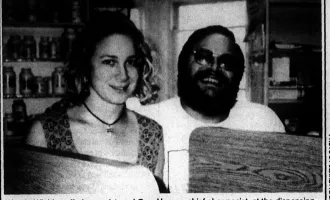This Date in UCSF History: Treating Police
Originally published in Synapse - The UCSF student newspaper April 29, 1982. A law enforcement officer comes into a mental health professional's office for counseling after a shooting incident. You know he is armed and you aren't sure whether he is a homicidal or suicidal threat. Do you tell him to “vent his anger?” How do you approach him?
Another officer comes to you from a local police department because he is depressed about a job related incident: You know he has a handgun with him. Do you tell him to get “into his sadness?” How do you approach this second officer?
These were but two of the issues raised at a two day seminar, April 23 and 24, at the Hyatt Regency in San Francisco, where mental health professionals and law
enforcement officers met to discuss “Psychotherapy and Law Enforcement: Issues and Techniques.”
Topics addressed the effective and appropriate treatment of law enforcement professionals, early warning signs of emotional problems, clinicians' concerns about cops, and officers' concerns about “shrinks.”
These concerns of law officers frequently lead to resistance of treatment. According to Michael Rossi, PhD, a psychologist with the UCSF Department of Psychiatry and former police officer, the purpose of the seminar was not to look at the law enforcement system as a whole but to discuss approaches to individual peace officers.
“To be effective in treatment (mental health professionals) must be aware of the law enforcement subculture,” Rossi noted.
It is a subculture that is constantly dealing with violence and seeing the worst that people do to each other. In addition, officers must constantly depend on each other for their physical well-being.
The need for mental health experts to understand this “subculture” was a theme constantly echoed throughout the seminar by many of the participants.
“Primary prevention is usually the cheapest and easiest way to head off mental health problems,” said Bebe Jacobson, PhD, staff psychologist with the Los Angeles Police Department.
He identified several major stressors of law enforcement officers: constantly changing work assignments, continually looking for and expecting crime, being a cop 24 hours a day, work overload, increasing amounts of paperwork, problems with courts, negative public image, and entering police work to help people only to find these expectations are not realized.
These ultimately make the officers feel like “they are butting their heads against a stone wall” — leading to stress and potential disability.
Los Angeles county has attempted primary prevention of stress related problems by having a full time, on-site psychologist who attends roll calls, rides with officers and spends time at the station.
This presence of a mental health professional brings familiarity and helps break down long standing barriers between mental health professionals and officers.
A peer counseling program has been initiated that includes training in how. to recognize when to refer fellow officers to professionals.
Female police officers are a subgroup with special problems in the law enforcement culture and they were the topic of a presentation by Susan Saxe, PhD, staff psychologist with the Los Angeles Police Department.
According to Saxe, problems unique to female officers include, “perception of a woman in a man's job; lack of support by her peers, family, and friends on occasion; problems combining assertiveness and femininity and the need to find new defense mechanisms when old ones become inappropriate on the job.”
The primary complaint that draws female officers to counseling is relationship problems off the job. Surprisingly older female officers have been resistant to the concept of counseling younger female officers, Saxe said.
The older one feel, “I had to go through it the hard way, why shouldn't they?” Paul Berg, Ph.D., a forensic and clinical psychologist, observed that one of the mistakes that mental health professionals make when working with peace officers is refusal to learn the system.
“You can't treat people in a system unless you know the system...So get off lam the doctor and get on with I am the learner,” he said.
The final two speakers were San Francisco Police Department Sergeants John Ballentine and Alan Benner, who said most officers are distrustful of mental health professionals and see them as “arms of the administration.”
Benner said that often “cops simply view mental health 'experts' as 'hired guns' whose job it is to convince a jury in one direction or another.”
The sergeants felt that one role mental health professionals could take is developing peer counseling programs.
Of over 400 law enforcement agencies in California, 95 percent of them have no mental health professionals working in their agencies.
“We know what we need and we will do it. What we want is your (mental health experts) help in doing it right,” said Benner about establishing counseling programs.


